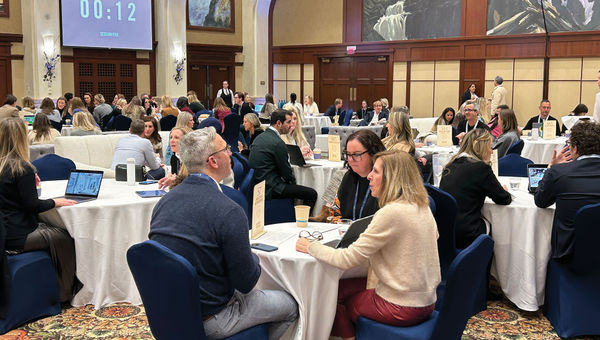LAKE LOUISE, Alberta — The luxury travel market may still be flying high, but price reductions could be on the way for high-end hotels and cruises, says one expert.
“I would not want to be an upper-level luxury hotel right now,” Clayton Reid, executive chairman and former CEO of travel and tourism marketing agency MMGY, said during a Jan. 23 keynote presentation at the annual SmartFlyer Core conference. “I think rates are going to have to come down a little bit.”
Reid delivered his remarks to an audience of approximately 160 SmartFlyer advisors at the Fairmont Chateau Lake Louise who were celebrating another strong year of sales. The luxury-oriented host agency enjoyed a revenue increase of 15% in 2024, COO Erina Pindar had told the audience a short while earlier. Last year, the average SmartFlyer advisor had $2.5 million in sales, more than twice the $1.2 million average for like-sized agencies, according to a SmartFlyer analysis of data available in the Travel Weekly Power List.
According to hotel data provider CoStar, luxury hotel rates in 2024 increased a modest 1% from 2023, reaching an average of $388 per night. However, rates are still up 31% from 2019.
The sharp increase from pre-Covid times led to a surge in the number of hotels charging more than $1,000 per night. In an analysis last fall, CoStar found that the number of U.S. hotels with an average annualized nightly rate of $1,000 or higher had risen from 22 in 2019 to approximately 80. The company observed similar trends in Italy and France. And since CoStar’s data omits many small luxury hotels, the true numbers are likely higher.
Reid said he doesn’t believe rates at the very highest tip of the market are destined for a dip. He cited as one example the Sheldon Chalet in Denali National Park, a five-room property accessible only by helicopter that is never rented to more than one party at a time and requires a minimum three-night stay at $96,000.
Such exclusive experiences cater to ultra-wealthy clients who aren’t likely to have a cash crunch. But Reid believes many customers of the larger luxury brands, such as Four Seasons and Ritz-Carlton, have reached a point where they’ll have to dial back.
“I think everybody has been paying whatever they need to pay to go wherever they want because they’ve had a lot of ammunition,” he said. “And I would argue that people in the upper middle class are running out of ammunition.”
Scarcity, Reid added, will drive continued demand for ultra-luxurious properties like Sheldon Chalet and for some of the most exclusive yacht and cruising options. But he expects price compression, not only in luxury hotels but also in luxury cruises and tours.

SmartFlyer’s outlook is very good
One sign of the growing squeeze on disposable income are credit card delinquency rates, which more than doubled between fall 2021 and fall 2024, and are now at levels not seen since 2011, according to Federal Reserve data. Meanwhile, U.S. credit card debt is at a record high.
But if there is a luxury contraction coming, it’s not yet reflecting on SmartFlyer’s 2025 business.
“It’s still looking really healthy,” Pindar said.

SmartFlyer advisors offered similar assessments.
Florida-based advisor Michelle Jackson said 2025 is shaping up to be a growth year. She said luxury hotel prices might stabilize, but she doesn’t expect a drastic decrease in room rates.
CoStar’s forecast is also reasonably bullish. The company predicts that RevPAR at U.S. luxury hotels will go up 2.9% this year and more than 2% in each of the following two years — all better figures than it projects for midscale and economy hotels.
But SmartFlyer founder and CEO Michael Holtz said he’s in agreement with Reid’s thesis, noting that $1,000-per-night rooms in New York used to be rare.
“Now you can’t find a good hotel for under $1,000,” he said. “We see rates at the Peninsula sometimes for $1,800, and I do think that there is a breaking point when some people are going to say, ‘You know what, I’m not coming to New York and spending $1,800 a night, I’m going to go somewhere else.'”
But Holtz said such sentiment could benefit the SmartFlyer network, since clients will be looking for the hotel value-adds, as well as the expertise, advisors can provide.
Pindar opined that a more fundamental post-pandemic dynamic will continue to support luxury travel demand.
“Whatever revenge travel that people did, it made them realize that travel is a necessity in their lives, and it’s a tool to learn more about themselves,” she said.












